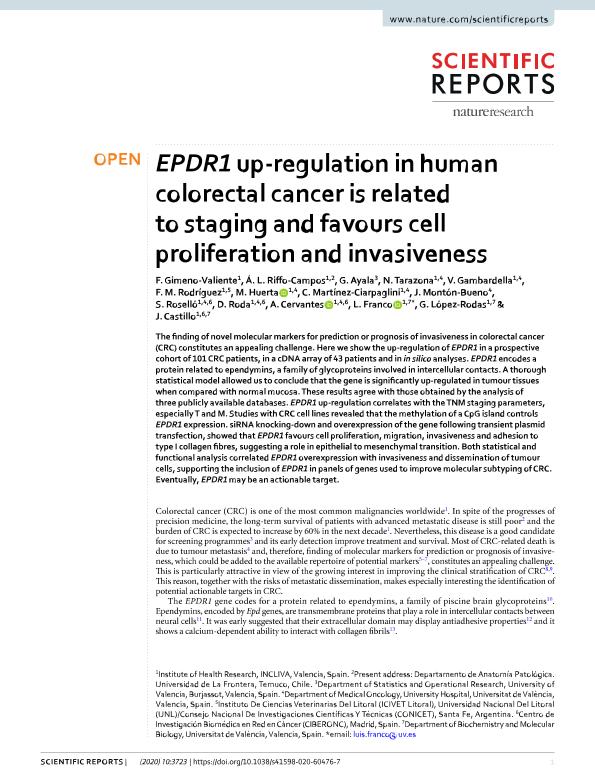Artículo
EPDR1 up-regulation in human colorectal cancer is related to staging and favours cell proliferation and invasiveness
Gimeno Valiente, F.; Riffo Campos, Á. L.; Ayala, G.; Tarazona, N.; Gambardella, V.; Rodríguez, Fernanda Mariel ; Huerta, M.; Martínez-Ciarpaglini, C.; Montón Bueno, J.; Roselló, S.; Roda, D.; Cervantes, A.; Franco, L.; López Rodas, G.; Castillo, J.
; Huerta, M.; Martínez-Ciarpaglini, C.; Montón Bueno, J.; Roselló, S.; Roda, D.; Cervantes, A.; Franco, L.; López Rodas, G.; Castillo, J.
 ; Huerta, M.; Martínez-Ciarpaglini, C.; Montón Bueno, J.; Roselló, S.; Roda, D.; Cervantes, A.; Franco, L.; López Rodas, G.; Castillo, J.
; Huerta, M.; Martínez-Ciarpaglini, C.; Montón Bueno, J.; Roselló, S.; Roda, D.; Cervantes, A.; Franco, L.; López Rodas, G.; Castillo, J.
Fecha de publicación:
02/2020
Editorial:
Nature Publishing Group
Revista:
Scientific Reports
ISSN:
2045-2322
Idioma:
Inglés
Tipo de recurso:
Artículo publicado
Clasificación temática:
Resumen
The finding of novel molecular markers for prediction or prognosis of invasiveness in colorectal cancer (CRC) constitutes an appealing challenge. Here we show the up-regulation of EPDR1 in a prospective cohort of 101 CRC patients, in a cDNA array of 43 patients and in in silico analyses. EPDR1 encodes a protein related to ependymins, a family of glycoproteins involved in intercellular contacts. A thorough statistical model allowed us to conclude that the gene is significantly up-regulated in tumour tissues when compared with normal mucosa. These results agree with those obtained by the analysis of three publicly available databases. EPDR1 up-regulation correlates with the TNM staging parameters, especially T and M. Studies with CRC cell lines revealed that the methylation of a CpG island controls EPDR1 expression. siRNA knocking-down and overexpression of the gene following transient plasmid transfection, showed that EPDR1 favours cell proliferation, migration, invasiveness and adhesion to type I collagen fibres, suggesting a role in epithelial to mesenchymal transition. Both statistical and functional analysis correlated EPDR1 overexpression with invasiveness and dissemination of tumour cells, supporting the inclusion of EPDR1 in panels of genes used to improve molecular subtyping of CRC. Eventually, EPDR1 may be an actionable target.
Palabras clave:
EPDR1
,
colorectal
,
cancer
,
human
Archivos asociados
Licencia
Identificadores
Colecciones
Articulos(ICIVET-LITORAL)
Articulos de INST. DE CIENCIAS VETERINARIAS DEL LITORAL
Articulos de INST. DE CIENCIAS VETERINARIAS DEL LITORAL
Citación
Gimeno Valiente, F.; Riffo Campos, Á. L.; Ayala, G.; Tarazona, N.; Gambardella, V.; et al.; EPDR1 up-regulation in human colorectal cancer is related to staging and favours cell proliferation and invasiveness; Nature Publishing Group; Scientific Reports; 10; 1; 2-2020; 1-14
Compartir
Altmétricas



